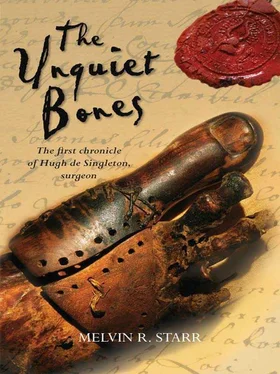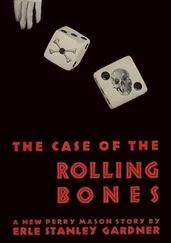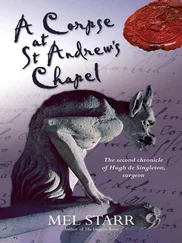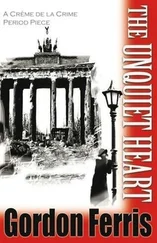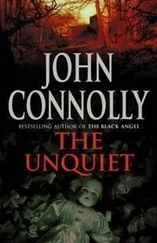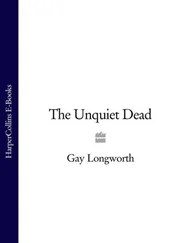Mel Starr - The Unquiet Bones
Здесь есть возможность читать онлайн «Mel Starr - The Unquiet Bones» весь текст электронной книги совершенно бесплатно (целиком полную версию без сокращений). В некоторых случаях можно слушать аудио, скачать через торрент в формате fb2 и присутствует краткое содержание. Год выпуска: 2008, Издательство: Kregel Publications, Жанр: Исторический детектив, на английском языке. Описание произведения, (предисловие) а так же отзывы посетителей доступны на портале библиотеки ЛибКат.
- Название:The Unquiet Bones
- Автор:
- Издательство:Kregel Publications
- Жанр:
- Год:2008
- ISBN:нет данных
- Рейтинг книги:4 / 5. Голосов: 1
-
Избранное:Добавить в избранное
- Отзывы:
-
Ваша оценка:
- 80
- 1
- 2
- 3
- 4
- 5
The Unquiet Bones: краткое содержание, описание и аннотация
Предлагаем к чтению аннотацию, описание, краткое содержание или предисловие (зависит от того, что написал сам автор книги «The Unquiet Bones»). Если вы не нашли необходимую информацию о книге — напишите в комментариях, мы постараемся отыскать её.
The Unquiet Bones — читать онлайн бесплатно полную книгу (весь текст) целиком
Ниже представлен текст книги, разбитый по страницам. Система сохранения места последней прочитанной страницы, позволяет с удобством читать онлайн бесплатно книгу «The Unquiet Bones», без необходимости каждый раз заново искать на чём Вы остановились. Поставьте закладку, и сможете в любой момент перейти на страницу, на которой закончили чтение.
Интервал:
Закладка:
“They would,” I agreed.
“So the king must do God’s work to enforce justice among men. It is his right and duty. So holy scripture tells us.”
It was my turn to nod agreement.
“But men must not take justice to their own hands,” he continued.
“What if a king will not do justly?”
The vicar was silent for a moment. “You pose another engaging question,” he said, finally. “Is a king who behaves badly nevertheless due homage as king? To say otherwise is to assert that God has made a mistake in placing such a sovereign.”
“Does God make kings,” I challenged, “or do previous kings and queens?”
“God knows all,” the vicar replied, speaking so softly that I could barely hear him over the wind whistling through the porch entrance.
“He does,” I agreed. “Does that make him responsible for all, even the deeds of bad kings, or bishops, or any other who may break his laws?”
The vicar’s eyebrows raised at that remark, but he was not deterred. “Job would say, no.”
“True. We must not blame God when men do wickedness in violation of his law.”
It was the vicar’s turn to nod agreement. It was warming to find harmony in such a cold place. “What does God require?” the vicar asked. He answered his own question: “To do justice, to love mercy, and to walk humbly with God,” he quoted from the prophet. This vicar was no illiterate priest, as were some.
“Micah,” I said.
His eyebrows lifted again. Above that nose, it was an impressive feat. “You know the scriptures?” he asked.
I explained that I had studied at Oxford. I generally avoid mentioning that, fearing resentment from village priests, most of whom had studied nowhere but at the feet of some other equally untutored priest. This vicar sighed, and remarked that he would have liked to complete a term or two at university. He was envious, but not jealous.
This philosopher’s discussion was entertaining, but not productive. I am suspicious of philosophers. There is nothing so foolish that, allowing his thoughts freedom, some philosopher has not said. I directed the discussion back to Sir Robert’s untimely end.
“Sir Geoffrey gave me to believe that Sir Robert made enemies through his, uh, unwanted attention to ladies.”
“They were not all ladies, and the attention was often welcome.”
It was my turn again to nod knowingly. Distant witnesses might have thought us two ravens pecking at the ground. When the vicar did not continue, I followed.
“He paid court to wenches?”
“He did.”
“From his father’s manor?”
“Aye.”
“But you will not tell me who?”
“I cannot. My pledge at the confessional screen…”
It was my turn again to nod. “Such maids, I concluded, were foolish to think his court was anything but dalliance.”
“They were,” he sighed, “but a wench may believe a foolish promise if he who makes it be convincing.”
“Sir Robert could be convincing?”
It was the vicar’s turn to nod.
“Did he promise marriage to a wench?”
“Nay, not that I know…but promised a lass he’d set her up in comfort as mistress.”
“And is her father a man to take action?”
“Dead of plague, two years ago.”
“A brother, then?” I wondered aloud.
“All younger, just lads. Probably know nothing but they have a nephew.”
“Does Sir Geoffrey know of this grandchild?”
The vicar’s turn to nod. “Worst of it is, he demanded leirwite and childwite from the lass. Sixpence, he required of her.”
“And he knew the father.”
“I’m sure of it.”
“Does the child thrive?”
“He survives. Sixpence, from them who had not two farthings to rub together.” The man sighed heavily at the injustices of the world.
The conversation continued, but I learned nothing more of Sir Robert. I bid the vicar farewell with the wish that we might meet again, and set Bruce toward home on the Oxford — Gloucester road. I could hear behind me in the distance the vicar ringing the noon Angelus bell, the sound carrying a mile or more on the gale blowing against my back.
It was near dark when I returned to the inn at Burford. I saw Bruce put to the stable and oats, then availed myself of bed and board, although not in that order.
The howling wind did not keep me awake long, but before I fell to sleep I heard, over the snoring of my companions, the hiss of snow driven against the shutters. Next day the snow was so fierce that I determined to spend the day with my thoughts, beside the fire. Bruce was tired from three days of travel and needed rest as well.
Snow continued the second day, but not so severe. One day of idleness might serve a worthwhile purpose; two days would not. Although it was Sunday, I decided to continue my journey. I directed a hearty feeding for Bruce, and ate well of the landlord’s unsavory table myself. I lodged a loaf under my cloak for midday, and pointed Bruce south up the hill and into the drifted road leading to Shilton and Bampton.
I saw no living soul, nor beast nor fowl, on the way to Shilton. The road lay unmarred before me. But Bruce was stout and rested, and broke the way with little strain.
Shilton lay buried, roofs white under their load of snow. Smoke wafting from under cottage eves and tracks in the snow where inhabitants had ventured out to the church, or to care for livestock or poultry, indicated that there was life under the white blanket. The house I sought had such footprints at its door. I knocked, and was admitted.
“Who…ah, it is the surgeon of Bampton. Caught in the storm? Where did you spend the night? Come in.”
I answered the older man’s questions, then turned toward a corner of the room where I saw Thomas at a table, spoon in hand and a bowl of pottage before him. “I would speak to you again of Margaret Smith,” I said.
The youth shrugged. My request seemed not to trouble him, but he took no more of his meal.
“Perhaps you will accompany me?” I asked, and motioned toward the door. “’Tis no day to be out,” he replied. “You may speak here.” He looked at his parents as he spoke. His meaning was clear: “I have nothing to hide.” But I knew now he did.
“You know of Matilda atte Water, of Burford?” I asked.
“Aye.”
“She prowls about at night, as you may know,” I told them. “Mad as a March hare,” the mother interjected.
“She goes to the churchyard, to speak to her husband. Early summer she went one evening, late, after curfew bell, and found two lovers quarreling behind the churchyard wall.”
I waited, but this information brought no comment from Thomas Shilton. So I pressed on.
“Matilda says ’twas you and Margaret.”
“She is weak in the head,” Thomas said evenly, and went back to his cooling bowl of pottage.
Between mouthfuls he spoke again. “Margaret and I quarreled on t’riverbank, as you well know. I never disputed with her in t’churchyard…or any other place but t’river.”
“Matilda knows you well?” I asked.
“Aye,” his mother entered the conversation again. “She were midwife to many hereabouts, ’till she went soft in t’head. No one’ll have her now, nor for ten years past an’ more.”
“She knows you well, so you say, and says so herself.”
“How could she see who was in t’churchyard at night?” Thomas challenged.
“’Twas near full moon. What did you promise Margaret?”
“Promise?” The youth was surprised, or acted so.
“Matilda overheard Margaret protesting your broken promise — to care for her if she was got with child.”
“With child?” I saw Thomas’ mouth drop, and he laid down the spoon. “I promised Margaret nothing. We — that is, I — assumed I need make no promise.”
Читать дальшеИнтервал:
Закладка:
Похожие книги на «The Unquiet Bones»
Представляем Вашему вниманию похожие книги на «The Unquiet Bones» списком для выбора. Мы отобрали схожую по названию и смыслу литературу в надежде предоставить читателям больше вариантов отыскать новые, интересные, ещё непрочитанные произведения.
Обсуждение, отзывы о книге «The Unquiet Bones» и просто собственные мнения читателей. Оставьте ваши комментарии, напишите, что Вы думаете о произведении, его смысле или главных героях. Укажите что конкретно понравилось, а что нет, и почему Вы так считаете.
